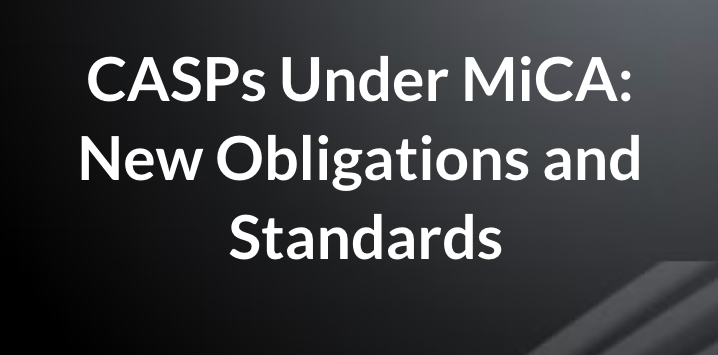Crypto-Asset Service Providers (CASPs): New Rules and Responsibilities Under MiCA

Introduction
The Markets in Crypto-Assets (MiCA) Regulation introduces a regulatory framework for Crypto-Asset Service Providers (CASPs) across the EU. It aims to ensure market stability, transparency, and protection for crypto consumers. This guide covers what CASPs need to know about MiCA’s registration, authorization, and prudential requirements.
1. Registration and Authorization: Becoming a MiCA-Compliant CASP
CASPs must be authorized by their national competent authority to legally operate in the EU.
Key Steps for Authorization:
- EU Registered Office: CASPs need to be legally registered in an EU country.
- Qualified Management: Managers must have clean legal records and relevant expertise.
- Governance and Continuity: Effective internal controls and business continuity measures.
Implications: Authorized CASPs can offer services across the EU under a single market license.
2. Prudential Requirements for CASPs
MiCA enforces prudential standards to ensure CASPs are financially sound.
Key Obligations:
- Capital Reserves: Adequate reserves or insurance to cover risks.
- Client Asset Custody: Secure, segregated storage of client crypto-assets.
- Fund Safeguarding: Client funds must be separated from company assets.
Implications: These requirements protect consumers and ensure financial stability for CASPs.
3. Conduct and Transparency Rules
CASPs must uphold professional standards to maintain market integrity.
Core Conduct Rules:
- Fair Practice: Prioritize clients' interests and provide transparent services.
- Clear Information: Honest communication of risks and features.
- Conflict of Interest Policies: Implement and disclose conflict-of-interest measures.
Implications: Enhances consumer trust and ensures that clients make informed decisions.
4. AML/CFT Obligations for CASPs
CASPs must align with EU-wide AML/CFT regulations.
Key AML/CFT Measures:
- KYC Procedures: Verify client identities to prevent money laundering.
- Transaction Monitoring: Detect and report suspicious activity.
- Compliance Programs: Ensure AML/CFT procedures are robust and up-to-date.
Implications: AML/CFT policies enhance market security and protect against financial crimes.
Why MiCA Matters for CASPs
MiCA’s new rules create a safer, transparent, and compliant crypto market in the EU. By adhering to these standards, CASPs can build trust, expand across borders, and ensure a competitive edge while reducing risks related to regulatory violations.
Preparing for Compliance
- Review MiCA Requirements: Know your obligations.
- Apply for Authorization: Register with the national authority.
- Meet Prudential Standards: Maintain adequate capital and safeguards.
Implement AML/CFT Policies: Ensure compliance with anti-money laundering rules
Related articles

MiCA Regulation in the EU: What Crypto Companies Need to Prepare for in 2025
The EU’s MiCA regulation will fully apply in 2025, bringing strict licensing, AML, and custody requirements for crypto firms. CASPs must prepare now with gap analyses, documentation, and regulator engagement to secure authorization and access passporting rights across the EU.
Read more
Should Amazon Add Bitcoin to Its Balance Sheet?
As Bitcoin continues to gain traction among major corporations, Amazon faces calls from shareholders to follow suit. The move could position Amazon as a leader in the digital economy, signaling innovation and embracing Bitcoin’s potential as a hedge against inflation and a store of value.
Read more
Bitcoin Reaches $100K – Is $150K the Next Stop?
Bitcoin has reached the historic $100,000 milestone, marking a pivotal moment in cryptocurrency's evolution. This achievement reflects growing institutional interest, global economic shifts, and Bitcoin's scarcity-driven fundamentals. As the world speculates on the next target—$150,000—the focus shifts to adoption, regulation, and macroeconomic trends that could fuel further growth. While challenges like volatility and regulatory uncertainty remain, Bitcoin’s ascent underscores its permanence as a transformative asset in the financial landscape.
Read more